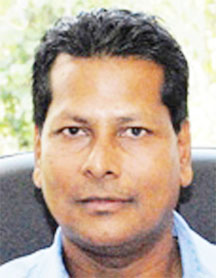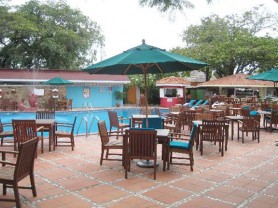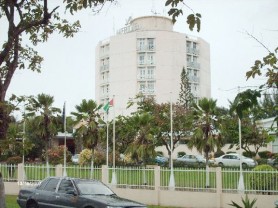Guyana Review talks with Robert Badal
Robert Badal is Chairman and CEO of Guyana Stockfeeds Inc of Farm, East Bank Demerara, a company with interests in the rice and edible oils sectors. The company employs 220 persons and its sales top G$8B per annum. He is also Chairman and Chief Executive Officer of the Pegasus Hotel, Guyana’s leading international Hotel. Mr Badal is a Chartered Accountant and the
holder of an MBA, majoring in Marketing

A.A: How do you believe you have fared during your career as a businessman in Guyana?
R.B: My own assessment is that I have been quite successful. I have had some difficult times. I have had difficulties, for example, in securing building and environmental permits for my rice mill. Concessions denied were granted to others who were not even in the sector. In consequence completion of this state of the art rice mill, a US$10m investment was delayed for two years after I had to move to the courts when the Central Housing and Planning Authority unanimously approved the permit only to have it rescinded on ministerial instructions. Prior to that there were issues with the EPA. The EPA approved the permit but then the Office of the President instructed that an environmental impact assessment be done in an effort to cause delay. I had to go to court in that case as well; so that there have been some difficulties. Frankly you expect that doing business involves some difficult terrain obstacles of this nature were not expected. It creates a very unpredictable environment and scares away investors from our shores.
A.A: You have come to be seen as a businessman who is not afraid to challenge authority when you believe that you are on the right side. Is that a fair assessment?
RB: It really is a question of having invested money and as such having a legitimate expectation of return. I understand my rights as a Guyanese citizen doing business in Guyana. I also understand the responsibilities I have to my country, my employees, my shareholders and the community in which I operate. I would not allow a government functionary, public servant or a statutory body to unilaterally curtail my legitimate business pursuits for devious reasons. The courts in the land are the last resort. Even though we say that the economy is growing there is still evidence of poverty all over the country with visible consequences including domestic violence, abuse of women and children and serious crime. These are, to a large measure, due to poverty. When people cannot find jobs, for example, when youths coming out of school and university cannot find work there are social consequences including a sense of hopelessness. The unemployment situation is serious. I have had about a thousand calls regarding a particular job vacancy for which I could only have taken eight persons. The only way the economy grows in a sustainable way to absorb our youths in the job market is through private sector investment. Government investments have implications for taxes whereas private investment places no fiscal burden on the taxpayers. Businesses create value and earn surpluses and sustain a cycle of re-investment that create more and more jobs. My view, therefore, is that no government, no institution, no statutory body should unduly interfere with private sector investment.

A.A: How do you react to the feeling which you appear to have that there is undue government interference in business? Is there a feeling of anger and frustration?
R.B: Certainly not anger; some measure of frustration perhaps, especially where the obstacles are deliberate and amounts to abuse of political authority. I generally respond to these kinds of challenges by adopting effective strategies to remedy the situation. I do not see these obstacles as insurmountable and I believe that that is why I have been able to get ahead.
A.A. How do you reconcile your success as a businessman with what you say are the many problems that you have encountered?
RB: Whenever I conceive of a project or a business venture I approach it from the standpoint that this is a worthwhile investment. I may encounter obstacles but it is the end result that is important.
AA: But surely the kinds of challenges and obstacles that you speak about makes the process more difficult. Don’t they?
RB: That is true. But I make allowances for that. I understand that there will be a certain amount of difficulty. I believe that I have developed strategies that are designed to ensure that I can get ahead. I have certain objectives that I want to realize and I certainly will not be deterred by those kinds of obstacles. That keeps me going. I am a Guyanese and I have no plans to go anywhere else; so I have to live with the challenges. I can only hope of course that one day we will have effective laws to bring to justice those who are creating obstacles to the growth of investment in our country because they stand in the way of job-creation and poverty-alleviation. No public official should frustrate economic progress by deliberately placing obstacles in the way.

AA: What about your long term goals and objectives as a businessman?
RB: The conventional wisdom is that business is about profit. For me it is about more than money. It is also about a natural drive that I have. I have deliberately selected certain sectors that I want to be involved in; the livestock industry; the rice industry and the edible oil industry. I believe that these are all core businesses that have a particular bearing on the development of the agricultural sector which, as you know, is crucial to this country’s development. My entry into the hotel and hospitality is a diversification of my investment portfolio which will grow if we put the correct policies in place. There are some difficulties facing the industry which need to be dealt with.
AA: Your entry into the hotel and hospitality sector – at the very top of the sector – probably came as a surprise to many. How have you geared yourself mentally for what is clearly a significant transition from the productive sector to the service sector?
RB: I agree with you that the orientation of the hotel industry is a lot different from the productive sector requiring every day focus. Having said that every business has certain commonalities, strategies, policies, recruitment, staff development, finance, marketing, these are all considerations that are common to all businesses. Here at the Pegasus I was lucky in the sense that I met and retained a strong professional team. The Pegasus has always been the benchmark of hospitality in Guyana due to very well-trained team. What I added to its strengths was a new vision and new approaches to every-day business. I suppose that the difference between the previous ownership and the present one is that our predecessors were bankers. They wanted a return and their interest was in selling. I am interested in the development of the property. The property was for sale, I saw the opportunity and I took it. I believe in investing in Guyana. As for starting at the top, as I you put it, why not? For me it was the best business option. Frankly, Pegasus with its long history, tremendous goodwill and repeat guests, its architecture and location makes it a heritage site, a pride of all Guyanese, local and overseas. So apart from the business side of the venture it is also a combination of other important factors.
AA: Would it be fair to perceive Robert Badal as a man who is seeking to prove something to himself and, perhaps, to other people?
RB: Not really. I take pride in what I do and expend the time, effort, skill and focus in ensuring success. I am driven not only by returns but also by love for my country and the responsibility I feel to Guyanese, my employees, shareholders, and the community in which my businesses operates. Without the Pegasus here a lot of people would not come to Guyana. Therefore I consider myself as having a big responsibility to those people who come into Guyana seeking to do business here. That, of course, impacts on the business sector and on the country’s economy. What is therefore more important is the level of responsibility I feel to continue the tradition of success. I never get up in the mornings wondering whether or not I am proving anything to anybody. I am more concerned with the responsibility that I have to my country.
AA: Do you believe that your outlook renders you vulnerable in any way?
RB: Given the kind of society in which we live and given the vindictiveness of some of the people in the corridors of power, I have to say yes. I have seen examples of people who have been victimized for petty comments and opinions and the list is long. From my standpoint if something is wrong it is wrong. I can think of nothing wrong in saying so. In fact I believe that all, especially business
people, have a responsibility to identify those things that are wrong and request redress or solutions, as these may affect the growth of businesses. Since it is only through the private sector growth that the economy will grow we in the private sector have a responsibility to raise our voices against barriers to that growth..There is really no other way.
AA: What about other issues which you consider to be critical to the creation of a healthy business climate?
RB: There are certain elements of democracy that are very important for the promotion of healthy business climate; things like a Freedom of Information Act, an independent Integrity Commission to address widespread manifestations of corruption in public office, an independent Judiciary and Central Bank and a new culture of governance that listens to and respects public views and needs in configuring policies. We need to have a system that ensures that anyone can sue in court and anticipate an outcome based purely on the merits of the case. The fiscal environment must be the same for every business. There should be no discrimination in the granting of incentives. A business environment must be level for all players and it must be characterized by equal opportunity for everyone. In Trinidad and Tobago, for example, the fiscal incentives are clearly written in the laws so that you do not have to go to a Minister of Government to seek your entitlements. A clerk in the relevant office will tell you what you are entitled to..
AA: Why is it that in spite of the fact that you are a major investor and a successful businessman you are not a member of the Private Sector Commission?
AA: I used to be a corporate member of the PSC. It is a good thing to be part of private sector organizations because of the importance of lending collective support to private sector causes. Unfortunately, I recall that when there were issues that needed to be addressed, the PSC was not addressing these issues. It appears that the Commission has always been gripped by a fear that if they raise their voices in matters that affect them they will be put on the black list or that their companies would suffer in one way or another. What we really need are the kinds of changes in regulations and procedures that ensure that you do not have to go to government officials seeking one concession or another. That helps to sustain the integrity and the independence of the private sector. What the private sector must do is to enter into negotiations with government leading to a situation in which their rights and entitlements are firmly written in the law. We cannot afford a private sector that is so gripped by fear that it consistently avoid the big issues, whatever the circumstances.
AA: Other businessmen have voiced concerns regarding the ability of the education system to adequately provide for the human resource needs of the private sector. Do you share those concerns?
RB: Yes, I do. There is an important link between the quality of education and the needs of industry as the latter is the major creator of job opportunities. When the economy grows most of the people seeking jobs end up in the private sector. I have seen that the University of Guyana is taking some steps at improving the relevance of its programmes but I am not sure about the extent of its progress. We need to determine the sectors that we want to promote and to have an understanding of the skills that are necessary to develop those sectors. I have found many times that applicants for jobs do not display the core skills needed for success; extended on the job training becomes necessary. I believe that students in the final year of university, for example, should be exposed more to practical projects and attachments to the business sector to ensure their orientation to the work place. There is also a great deal of merit in mentoring programmes which ensure that students have access to experienced mentors.
AA: In the midst of all the challenges which you say are associated with doing business in Guyana, have you ever contemplated migration.
RB: No. It has never crossed my mind. I like the climate, food, the ethnic diversity and the connection with home. I can go to Miami or to Trinidad or to Barbados for a weekend; but on Monday I want to be back home. I know a number of people who have gone to North America and have come back after many years only to find that they have lost something. Whenever I travel to North America and talk to people there they all have a wish to return. But they are concerned about many things including issues of security, reliable electricity, equal opportunity, discrimination. They want a social, economic and political environment in which no one abuses power, where no one has any advantage over the other; where there is no sense lawlessness and where there is sense that the security and legal systems are functioning effectively. These are the things that make a country great and make a country keep its people.




